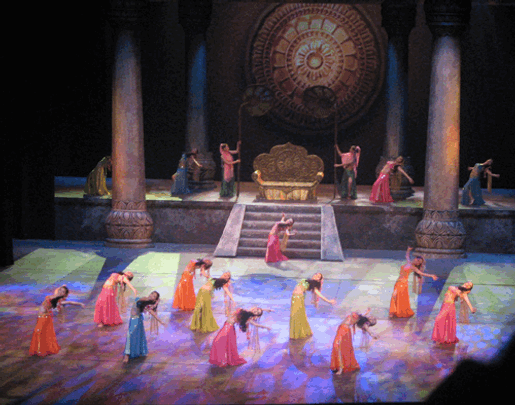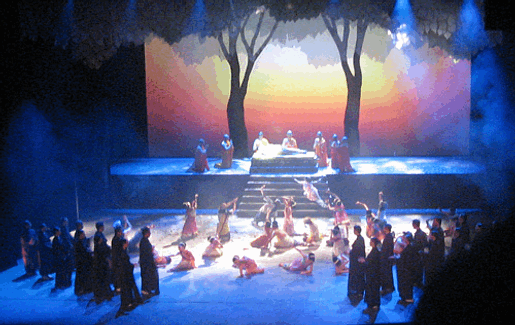

by Bilqis Hijjas
Prince Siddhartha, The Musical
22 – 31 May 2009
Musical on Stage Productions
Istana Budaya
~
I have seen a number of productions from Musical On Stage. A couple of my friends, all very fine dancers, perform in the ensemble. It is appropriate that Musical On Stage should have the best dancers, as in other ways too they seem to lack for nothing. Their budget is impressive. Their productions are famous for their material extravagance — the no-expenses-spared sets, costumes, music and ensemble size.
The previous production of The Perfect Circle staged at KLPac’s Pentas 1 was somewhat restrained by the capacity of the space, but in the suitably lavish environs of Istana Budaya there are no such limitations. So, with their most recent production, Musical On Stage has indulged its every whim. For every scene change, massive sets descend from the flies and the stage itself moves up and down. The large ensemble — I counted more than 25 dancers — whirls through costume changes. The money spent on projected animation and synthesized backdrops alone must have been enormous.
 Concubines, hard at work
Concubines, hard at work
But there is one unavoidable fly in this ointment. This particular musical is about Prince Siddhartha, who became the Enlightened Buddha, whose contribution to humankind, according to the musical, was to teach them to turn away from transient and material happiness to contemplate more universal and eternal themes. He eschewed his family’s royal bounty to don the simple robes of a monk. He encouraged a feeling of spiritual equality between all classes of people. So when his tale of modesty is told with all the pomp and circumstance that can possibly be mustered, doesn’t the term “Buddhist musical” seem an oxymoron?
Perhaps a religious musical in any sense is never particularly successful, unless treated with a heavy dose of humour or absurdity. Jesus Christ Superstar had to be jazzed up with lots of sex and Seventies costumes to make it palatable. In addition to scale and extravagance, many classic musicals appeal because they allow the audience to vicariously indulge in all sorts of delicious evil. Gary Kamiya of Salon once wrote that the glaring flaw in the classic Christmas tale It’s a Wonderful Life is its depiction of Pottersville. “We are intended to shudder in horror at the sinful city he [Potter] has spawned… There’s just one problem: Pottersville rocks!” And so it is with Sweet Charity, Chicago, and Grease — never were dissolute harlots’ legs so charmingly parted. Musicals cannot thrive on goodness alone. It is sex, drugs and rock’n’roll that get them going.
The same is the case in Prince Siddhartha. The scene in which a crowd of palace concubines try to seduce Siddhartha is the most colourful, musical and attractive. When Siddhartha encounters the dreadlocked ascetics living underground, whipping themselves and indulging in weird yoga, the scene is fantastically stalactite-ridden. Later when Siddhartha’s rival gets repeatedly struck by lightning and then dragged down to the fiery depths of hell (the stalactites now doing double duty) – oh, what a celebration of sound and fury, colour and light! And as for the emergence of the Devil and his wicked daughters, well, that looked like a pretty good carnival too.
Musicals also need sympathetic characters, the shadier the better. The Enlightened Buddha, through no fault of the actor who portrays him, is entirely unsympathetic, and in fact that’s the way the Buddha would like it. Let’s have no worldly feelings of sympathy here! The only character who raises a heartbeat is Siddhartha’s father, the old king. In the beginning he appears ridiculously mustachioed, clad in anachronistic shiny synthetic material and giving vent to a terrible caricatured laugh — “Ho ho ho ho!” Yet in the end, when he is reunited with his son who has become the Buddha, and who cannot express any love for his father, uttering only platitudes, then we feel a pang of distress for the old man. In the next scene the Buddha meets his former wife, who after a bit of token soul-searching kneels down and energetically devotes her life to Dharma. Now the old king’s solitude is complete. Everyone who has meant anything to him is either dead, or has betrayed him to embrace a logic that he cannot accept. I am glad that, despite its other faults, Prince Siddhartha, The Musical never forced the old king into the same ecstatic heights which all the other characters so easily attain. It leaves the old king the one true tragic figure on the stage.
 The death of Buddha
The death of Buddha
Musicals, like all theatre, are characterised by impermanence and the fulfillment of desire. The Devil character says that Buddha wishes to destroy this evil world on which the devils prey, but an audience preys on such things too. In order to feel redemption, the audience must first witness and experience suffering. So a musical, as an art form, cannot do justice to the ideals of Buddhism. And Buddhism seems an inappropriate and paradoxical theme for a musical.
(BH)
Sorry, the comment form is closed at this time.
Thanks for this, Bilqis. I had a similar unease when I first saw posters for this show some weeks ago. The bon vivant quality of a musical seems at odds with the message of Siddhartha’s life. Though seemingly opposed form and content need not be unproductive. I’m on volume 2 of Osamu Tezuka’s epic Buddha manga series. The pulp format and comic violence of manga seem to entertain and provide drama that underlines the more serious points that are made.
Suoi Tien Park, Vietnam – Buddhist Themepark
I wonder if this can do justice to Buddha?
http://www.youtube.com/watch?v=cB7cxCc9wE
Pretty intense explaination of Buddhist Hell
http://www.youtube.com/watch?v=iSi41Sgx-R8&feature=related
It’s so damn medieval. Can’t believe so much of Asia is into this.
When it comes to religion, I think Islam’s iconoclasm was the smartest way to avoid such ‘contradictions’ from occuring but the downside is that you can get a fatwa on your head just for drawing cartoons of the prophet…
Just as one can appreciate Islamic architecture without being a muslim, so a story about Buddha’s life can be entertaining without being ‘buddhist’.
Buddha himself preached the middle way – distance from self-deprivation as well as self-indulgence. As a Buddhist, I totally disagree that Buddhism makes an ‘inappropriate’ theme for a musical.
Furthermore, Buddhism is about freedom and self-enlightenment, not redemption. One could argue that the more ‘seriously’ one takes Buddhism, the less Buddhist that is!
‘If you meet the Buddha, kill him’ – old Zen saying.
Kill Buddha?
Mmmmm massacre on the theatre set :D
Woah, a buddhist musical! Quite a spectacle huh?
It’s nice to see how a subject as serious and ascetic as Buddhism is given this light-hearted once over. I haven’t seen the musical but it seems like the producers and directors don’t really push the musical far enough.
It looks garishly kitschy! As an educational staging, I guess it fulfils its purpose but you know, when you wanna talk about buddhism, it could be a lot more interesting if the religion’s discourse on form/non-form and self/non-self could be explored a little more and how these ideas inform theatrical staging and narrative rather than just training a didactic angle on Buddha’s life story.
Are they the same team that produced last year’s horribly chauvinistic Jewel of Tibet? Princess Wen Cheng civilised the barbaric Tibetans indeed!
The difficult with depicting anti materialist philosophies, is essentially in that initial thought process itself – why depict an anti materialist philosophy.
Many of the world’s philosophies discourage materialism, and yet become bound up in it themselves, this too has happened with the philosophy of The Buddha.
In theatre, as in other forms of creative endeavour, we the audience are requested to leave our disbeliefs at the doorway, in a willful suspension of disbelief, only in that way can we belief in Star Trek’s 5 year mission, or that Wolverine has adamantium knives issuing from his fingers, or indeed that the life of The Buddha can be a musical.
See this musical as just that – a musical, lavish, adventurous, colourful, or not, but little to do with the Buddhist philosophy, it is a fabrication, a creative endeavour meant to entertain not to preach the anti materialism of The Buddha.
We have enough censorship, do we need to add more, I wonder.